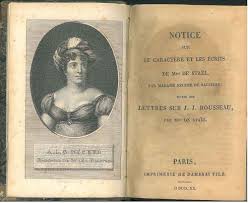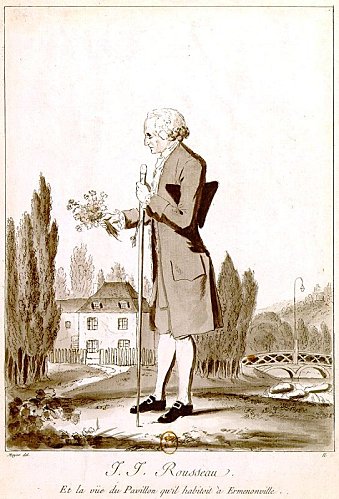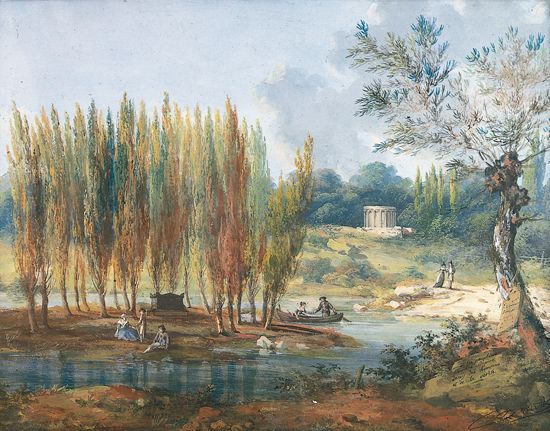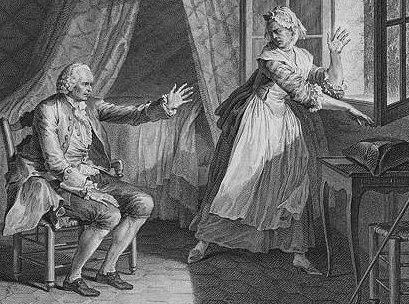|
I was alerted by Eveline Groot, who gave a great talk this week at the Braga Colloquium on Women and the Canon, to yet another slight in the history of philosophy against a woman. This time, it's against Germaine de Stael, a writer who saw her share of slights in her life time, including some from Manon Roland and Sophie de Grouchy. But what Eveline Groot found is a 20th century historian of philosophy (or philology), who chooses to minimize the impact and import of Stael's philosophical commentary on Rousseau. Writing in 1915 in Modern Philology (13:7), G.A. Underwood claims that in her reading of Rousseau, Madame de Stael saw only the sentimentalist of the New Heloise, and not the rationalist of the On Social Contract, and that her Notice sur le Caractere et les Ecrits de J.J. Rousseau demonstrate 'little beyond an enthusiasm for Rousseau's ideas' (adding that the enthusiasm itself was significant'. Underwood concludes the introduction to his paper on Stael's interpretation of Rousseau by announcing that: 'The thesis will be that Rousseau leads Madame de Stael to become absorbed in her feelings'. The conclusion of the paper reads as follows: Such is the somewhat undeveloped Rousseauism of Madame de Stael when she began writing. It is an emphasis on temperamental inclination rather than a ripened criticism. A continuation of this study would show how in her mature and original work Madame de Stael gradually thought out to definite literary and philosophical tenets those ideas of Rousseau to which she was so strongly attracted. So one may well wonder why Underwood decided to write the article showing that in her early work, Stael was not a proper philosopher, but yet another female with inflamed emotions, rather than study the philosophical tenets he agrees she later came up with.
We can add G.A. Underwood to the list of scholars for whom, when it comes to the study of women philosophers, the important work to be done is to show how uninteresting and un-philosophical their work was.
1 Comment
Every year for Christmas and New Year we dread the loss of the celebrities we love, and reminisce those who died during the year. Apparently it was very much the same in Eighteenth century France, if Manon's letters are anything to go by. On 2 January 1777, she wrote to her friend Sophie Cannet: Rousseau is not dead. He did not take a fall, as it was reported, and was not even even ill. I would have been annoyed had he disappeared before I got to see him. Were it not for certain troubles I cannot seem to shake, there are some things I might try, I would not write, as his wife refuses to accept that I am the author of my own letters, but... but... I must leave such projects to a later time. Unfortunately Manon never got to put these plans into action as Rousseau did die a year and a half later. On 6 July 1778, she sent the news to Sophie's sister, Henriette: Jean-Jacques is dead. I was given the news yesterday at dinner. Immediately, I felt my appetite disappear, my stomach tighten and heave at the thought of eating anything. Why? ... The best of Rousseau stays with us; anything else is but released from pain. His life is filled, his spirit and his sentiments are still here, so why am I so saddened? When Manon Roland was 21 she heard that Rousseau was in Paris and decided to try and meet him. A friend of hers, a fellow Genevese provided the introduction and the reason for the visit: he's commissioned some music from Rousseau and she was to pick it up. So she wrote him a letter and went to his house, accompanied by her nanny. She relates the visit in a letter to her friend Sophie, on 29 February 1776. Thérèse Levasseur with Jean-Jacques Rousseau. When Manon knocked, the door was open by Therese Levasseur who asked her rudely what she wanted.
- "To speak to Monsieur Rousseau - is this his home?" - "What do you want with him?" - "An answer to a letter I wrote a few days ago." - "Well, Miss, you can't speak to him. But you can go and tell the people who made you write - for surely you did not write this letter..." - "Pardon me?" - "The hand itself is clearly a man's." - "Would you like to watch me write?" Laughed Manon. She did not see Rousseau, who was old and sick and saw no visitors anyway, but Manon went back home with, she says, the slight satisfaction that he found her letter well enough written that he thought it could not be by a woman. |
About
This is where I live blog about my new book project, an intellectual biography of three French Revolutionary women philosophers. Categories
All
Archives
November 2022
|




 RSS Feed
RSS Feed